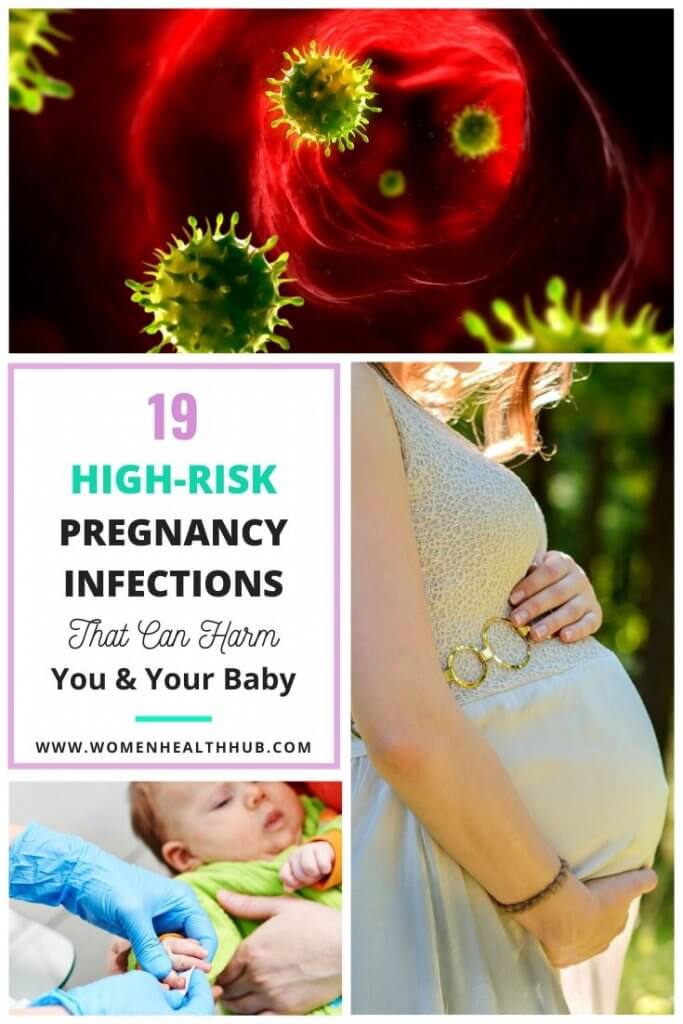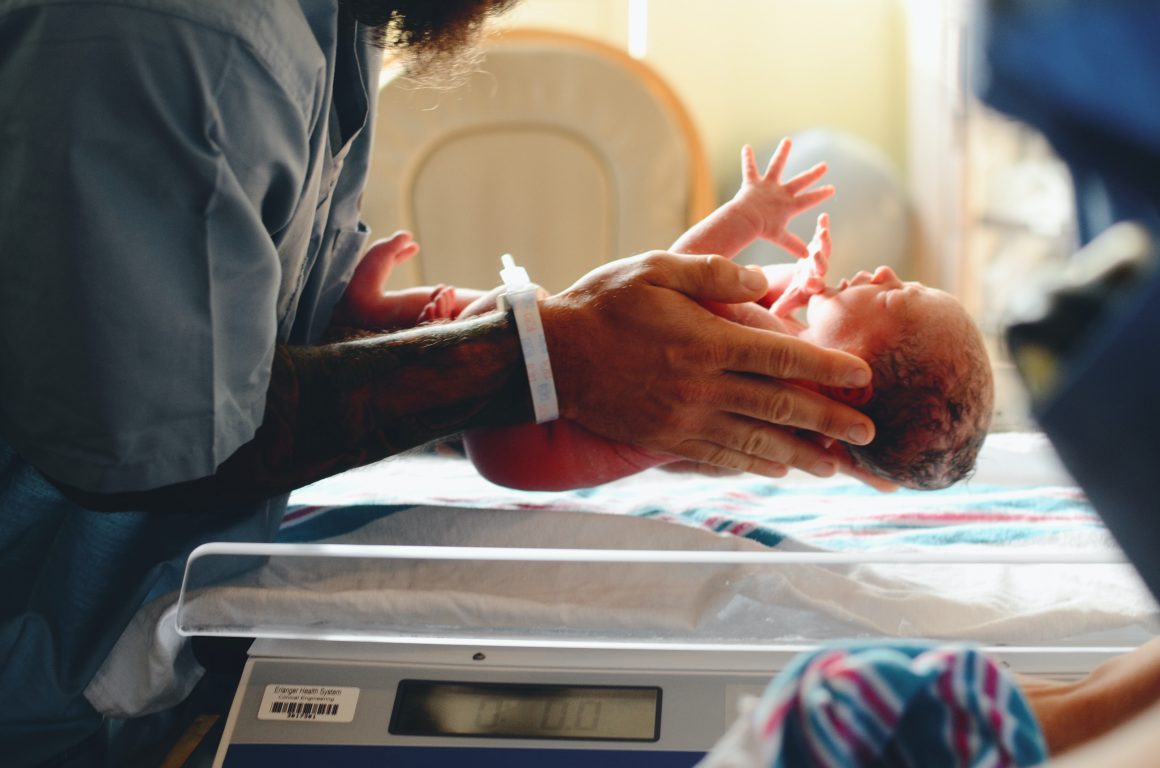Hey there! This post may contain affiliate links. As an Amazon Associate, I earn a teensy commission from qualifying purchases when you buy through these links (at no additional cost to you). For more info, please check the full disclaimer.
Women are susceptible to many maternal infections during pregnancy that can potentially harm your and the baby’s wellbeing.
Recent research in 2020 by the Division of Vital Statistics, found out the number of pregnant women diagnosed with three popular infections namely gonorrhea, syphilis, and chlamydia, between 2016 and 2018.
The results were shocking!
Despite an increase in STI awareness, there was a whopping 52% rise in total pregnancy infections. The incidence was higher in black women, smokers, and those who didn’t take much care of their bodies during pregnancy.
The good news is that for most problems, there are antibiotic drug therapies available to quickly control the symptoms before worsening.
So why is it important for you to protect your body against pregnancy infections?
While carrying, your body’s immunity and systems such as the heart, lungs, and abdominal organs are under pressure. Lack of proper immunity makes you vulnerable to catching viral and bacterial infections while expecting.
As an adult, it may be easier for you to fight off infections after taking a few antibiotics. But if you transfer a virus to your little one during pregnancy, that can lead to several childbirth complications and even neonatal diseases.
Thus, knowing the signs and risks of viral or bacterial pregnancy infections can help you identify and get on-time treatment.
In this blog, I’ll discuss 19 risky infections during pregnancy that may harm you or your baby’s health.
Let’s get started.

1. Bacterial Vaginosis (BV)
Every year, 1 million pregnant women suffer from BV, according to an estimation by the Centers for Disease Control and Prevention (CDC).
Your vagina contains many healthy bacteria whose job is to kill the disease-causing bacteria. However, some activities lead to an overgrowth of infectious bacteria, causing BV.
This condition is common in women who’re in the reproductive age group. Not getting timely treatment for this bacterial infection during pregnancy can result in numerous health complications for you and your little one.
If you’re trying to get pregnant and have BV, you may experience Pelvic Inflammatory Disease (PID) or infertility.
Even though it’s not an STI, it usually spreads through intercourse. If you’re pregnant, belong to the African-American community, have multiple sexual partners, or use birth control such as an IUD (Intrauterine device), you may be at high risk of BV.
You may not notice any symptoms right away. But when you do, diagnosis is easier. Generally, doctors don’t recommend screening unless there are some symptoms.
Signs:
- Grayish vaginal discharge
- Itching, soreness, and burning in the vagina
- Inflammation while peeing
- Foul smell after sex
Risks:
- Premature birth
- Low birth weight
- Pelvic inflammatory disease (PID)
- Miscarriage
- Meningitis in newborn
Treatments:
- Antibiotic tablets
- Antibiotic creams or gel
Prevention tips to avoid BV:
- Avoid having sex entirely
- Use protection during sex with your partner
- Avoid washing the vagina with water frequently
- Don’t use fragrant scents or soaps to clean vagina
- Avoid having intercourse with multiple partners if you’re trying to get pregnant
- Don’t skip medications during treatment
- Avoid having sex while getting treated
2. Group B Streptococcus (GBS)
GBS is yet another bacterial infection that occurs during pregnancy by Group B streptococcus. You could be one of the 25% pregnant women with GBS bacteria displaying no apparent signs at first.
GBS is not an STI or transmitted through contaminated food or drinks. This type of bacteria lives in rectum, intestines or vagina naturally, even if you’re overall healthy.
You can pass on the GBS infection during pregnancy to your little one. This condition is more harmful to your baby than you.
The good news is that only 1 out of every 200 babies suffers from this condition.
Doctors would normally screen you to detect signs of GBS during the 3rd trimester. Especially if you have given birth before the due date, you may be screened for this infection.
Signs:
- Fever at the time of delivery
- Premature rupture of membrane (breaking of water)
- UTIs
- Previous birth with GBS
Risks:
- Bladder infection
- Sepsis (blood infection) in newborns
- Meningitis in newborns
- Heart problems in newborns
- Pneumonia in newborns
- Mental disabilities in newborns
- Permanent physical disabilities in newborns
- Kidney and digestive problems in newborns
Treatments:
IV antibiotics
Prevention tips to avoid GBS:
Start antibiotic treatment immediately
That’s a scary number!😨
✅ Here’s a list of 19 risky pregnancy infections you should know about + tips on how to prevent them.
3. Candidiasis (Vaginal Thrush)
Candidiasis is a serious maternal infection caused by a type of yeast called Candida. In many countries, this infection is also known as vaginal thrush or the yeast infection of the vagina.
According to a 2010 research, 10% of women in the US develop at least one kind of yeast infection while carrying.
Another study published in the Journal of the College of Physicians and Surgeons in Pakistan confirmed that 38% of women out of 110 were found to have candidiasis with 27% of them displaying symptoms.
Women with other health issues such as diabetes had an increased risk of vaginal thrush.
Lower immunity and the out-of-balance pH levels in your body serve as the perfect acidic environment for candida growth. Normally you do have fungi in your vagina. But in an acidic environment, they may overgrow and lead to a vaginal yeast infection during pregnancy.
Although rare, pregnant women can pass on thrush to their babies at delivery time. It may only cause a rash in your newborn but in severe cases, candidiasis may lead to serious complications.
Thrush becomes worse if you have other infections such as HIV during pregnancy. The good news is that vaginal thrush is easily treatable.
If you have thrush, avoid breastfeeding until you’ve consulted with your doctor.
Signs:
- Vaginal soreness
- Weird colored vaginal discharge with a bread-like smell
- Vulva itching
- Inflammation while peeing
- Painful sex
Risks:
Passes on to the baby during delivery
Treatments:
- Antifungal creams
- Nystatin powder
Prevention tips to avoid Vaginal Thrush:
- Avoid wearing tights, jeans or leggings for a while
- Wear silk or cotton underwear
- During periods, change pads quickly
- Avoid douching or washing the vagina with water very often
- Use water-based lubricants
- Practice good anal and vaginal hygiene after going to the toilet
- Don’t take bubble baths or use soaps to clean vagina
4. Oral Thrush
Oral thrush is a type of fungal gum infection also caused by Candida. Although it attacks more pregnant women than non-pregnant, oral thrush is more common in infants.
Oral thrush affects various parts of your mouth including gums, inner cheek, tonsils, mouth, and tongue. If you have difficulty in chewing or swallowing or a cottony feel, it could be a sign of oral thrush.

Your body contains a healthy amount of microbes in every region. While pregnant, as your body undergoes many hormonal and reproductive changes, the nature of these microbes alter as well.
A drop in pH levels makes your mouth’s environment acidic. This results in an overgrowth of Candida, leading to oral fungal infections during pregnancy.
While pregnant, there’s no evidence so far that thrush could harm your baby. However, you can pass it on to your little one if you’ve thrust at the time of delivery.
There’s one precaution to keep in mind — taking oral antifungal drugs to treat thrush is linked to miscarriages and can potentially harm your baby. So avoid taking any such tablets and instead rely on creams.
Signs:
- White lesions on tongue, gums or mouth
- Tastelessness
- Bleeding lesions
- Cottony or cottage-cheese like appearance and feel in the mouth
- Redness or soreness in the throat
- Difficulty in eating food
- Cracked mouth corners
Risks:
Passes on to the baby during delivery
Treatments:
- Rinse your mouth using saltwater
- Antifungal creams
Prevention tips to avoid Oral Thrush:
- Practice proper oral hygiene by brushing your teeth or flossing twice regularly
- Avoid using mouthwashes
5. Urinary Tract Infections (UTIs)
Expecting women are at high risk of getting urinary infections during pregnancy. Almost 10% of pregnant women experience UTIs and may recur more than once.
UTIs commonly affect your urinary organs such as kidneys, urethra, urinary tubes, and bladder. Your baby takes up a majority of space, putting pressure on the bladder and tube.
The pressure may cause difficulty in peeing. This traps the urine in your body and thus, bacteria are produced, leading to UTIs.
If the pee has an unnatural color, it means there’s an excess of sugar or hormones, which is yet another reason for bacterial breeding.
You may not notice any symptoms right away. Usually, your doctor may ask for a urine test to determine which type of bacteria is present in your urinary system.
If you don’t get timely and proper treatment for UTIs, it can severely affect you and your baby’s health.
Signs:
- Abdominal cramps
- Difficulty in peeing
- Smelly or foul-colored urine
- Pain or inflammation while peeing
- Frequent need to pee
- Blood in urine
Risks:
- Premature labor
- Kidney infections
- Low birth weight
- Sepsis leading to miscarriage
- Cerebral palsy
- Preeclampsia
- Anemia
- Infant death
Treatments:
Antibiotic drugs
Prevention tips to avoid UTIs:
- Don’t rinse the vagina with water frequently
- Avoid using chemical-based products near or in the vagina
- Drink water frequently
- Use cotton underwears
- Use water-based lubricants
- Avoid wearing tight fitted pants
- Empty your bladder before and after sex
- Practice good genital and anal hygiene
6. Influenza
Flu is a serious maternal viral infection that goes beyond just a fever and runny nose. Catching influenza infection during pregnancy can be harmful to you, if not treated on time.
Flu spreads rapidly and easily by coming in contact with an infected person. When they sneeze or cough, their droplets land on surfaces and upon touching, passes on to the next person.
Doctors will normally recommend getting a flu shot before or during pregnancy if you’re not immune to this virus already.
Getting vaccinated against influenza during pregnancy is one of the best ways to prevent yourself from complications such as lung infection and insufficient oxygen supply.
A 2018 study shows that flu-vaccinated pregnant women have 40% less risk of getting hospitalized than those who aren’t.
The good news is that the flu rarely affects a baby’s health. However, I’d advise taking extra precautions, especially during the flu season, if you’re pregnant.
Signs:
- Sore throat
- High fever
- Headaches
- Vomiting
- Runny nose
- Fatigue
- Dizziness
- Coughs
Risks:
- Pneumonia
- Preterm labor
- Premature birth
- Birth defects
Treatments:
- Vaccination
- Antiviral drugs
Prevention tips to avoid Flu:
- Frequently wash your hands after touching unclean surfaces
- Avoid getting close to crowds
- Avoid sharing your utensils or food with others
- Practice proper hygiene while sneezing or coughing
- Use sanitizers or a hand wash to clean your hands
7. Hepatitis
Hepatitis is one of the most popular maternal viral infections — pretty much everyone has heard this name. Hepatitis cases are often found in countries that have poor hygiene and low economic background.
First, I’d like to give you an overview of the different types of hepatitis that may affect you during pregnancy.
- Hepatitis A (HAV): Usually transfers through mouth or feces so mother to baby transmission is rare. However, high risk HAV may occur during the 2nd or 3rd trimester.
- Hepatitis B (HBV): If a pregnant woman has HBV, she can transfer it to her baby and cause chronic infection and development problems.
- Hepatitis C (HCV): Although rare, transmission of HCV from an HIV-diagnosed pregnant mommy to a baby is possible and leads to chronic infection in newborns.
- Hepatitis E (HEV): The most dangerous form of hepatitis infection during pregnancy. It occurs during the 2nd or 3rd trimester and leads to liver failure, eclampsia, fetal death, or preterm delivery.
As you can see, Hepatitis E (HEV) is the riskiest of all. A study shows that over 2500 stillbirths each year are attributed to pregnant women with HEV in underdeveloped countries.
During pregnancy, your immune system is already under a lot of pressure. When attacked with HEV, it’s usually difficult to safeguard your baby against the risks.
You could contract this virus after drinking contaminated water or through the fecal-oral route. To confirm the diagnosis, your doctor may recommend a blood test for analysis.
Signs:
- Liver damage
- Nausea or vomiting
- Abdominal pain
- Fever
Risks:
- Jaundice
- Death of mother
- Miscarriage
- Stillbirth
- Death of newborn
Treatments:
- Vaccination
- Antivirals
Prevention tips to avoid Hepatitis:
- Get shots before traveling to any place known for high hepatitis rates
- Avoid sexual intercourse without protection
- Avoid consuming cooked foods off the streets
- Avoid consuming questionable dairy products
- Wash vegetables and fruits properly before eating
- Practice good hygiene after going to the toilet
- Drink boiled or bottled water
8. Listeria
While pregnant, you’re eating for two. So your nutrition choices have to be deliberate and careful. Otherwise, it can lead to severe bacterial infections during pregnancy and affect your baby’s health.
One such infection popular among expecting women is Listeria — a form of food poisoning caused by a bacteria called Listeria monocytogenes.
According to the CDC, listeria affects almost 17%, pregnant women. The risk of women experiencing this type of food poisoning is 20 times higher during pregnancy.

Primarily, this bacteria enters your body through undercooked meats and plants and unpasteurized milk. Some foods such as cheese made from unpasteurized milk can also lead to listeria.
Symptoms of this bacterial infection may take a few days to a couple of weeks to appear. As soon as you experience any signs of listeria or suspect that you have consumed contaminated food, immediately refer to a doctor.
If you pass on listeria to your baby, he/she may experience meningitis or blood poisoning. To confirm whether your baby is safe or not, your doctor may perform an ultrasound or a blood test.
Be sure to get a timely treatment of listeria to prevent the infection from reaching the brain or affecting your little angel.
Signs:
- Diarrhea
- Nausea or vomiting
- Fever
- Muscle stiffness
- Headache
- Cold
- Drowsiness
- Joint pain
Risks:
- Miscarriage
- Preterm birth
- Death of newborn
- Brain infection in babies
- Uterine infections in mothers
Treatments:
- Antibiotics
Prevention tips to avoid Listeria:
- Cook all types of meat(seafood, beef, etc.) and veggies thoroughly until tender
- Make sure you’re not eating a lot of processed foods
- Choose hard cheese instead of eating soft cheese
- Avoid consuming cooked foods off the streets such as salads or burgers
- Wash vegetables properly before consumption
- Wash cutlery and crockery used for raw food
- Heat the precooked foods at adequate temperatures
Read More: 25 Must-Have Foods For Preventing Heartburn During Pregnancy
9. Rubella
Rubella is also known as German Measles. Luckily, it has become somewhat an extinct viral infection in many countries.
Rubella causes rashes on the body and shows up with flu-like symptoms. The virus spreads when you come in contact with the saliva after an infected person coughs or sneezes.
If you catch rubella infection during pregnancy, here’s how high the risk can be for passing on the virus to your baby in each phase:
- First trimester (week 1 to 12): Very high risk — up to 85% chance of transmitting rubella during pregnancy.
- Second trimester (week 13 to 16): Medium risk — 50% chance of transferring the virus to the baby.
- Third trimester (week 17 onward): Low risk — 25% chance of virus transfer from mother to fetus.
Contracting this virus while you’re carrying can be risky for your baby’s development. Congenital rubella (that transfers from mommy to baby) has lasting physical damage. In short, there’s nothing you can do to reverse it.
The best thing you can do for yourself and your little one is to get vaccinated for rubella before pregnancy. You cannot get vaccinated during pregnancy. After your baby is born, make sure you get him/her vaccinated for rubella as well.
Doctors will generally check to see which viruses you’re immune to, before or during pregnancy. In case there’s a risk, you’ll be asked to get your blood tested.
Signs:
- Headaches
- Mild fever
- Swollen glands
- Joint and muscle ache
- Pink rash on the entire body
- Irritation and red eyes
- Runny nose
Risks:
- Stillbirth
- Deafness in birth
- Miscarriage
- Growth impairment
- Preterm birth
Treatments:
- Hyperimmune globulin prescription
- Pain-relieving medicine
Prevention tips to avoid Rubella:
- Get MMR vaccine before trying to get pregnant
- Get tested whether or not you’re immune to rubella during pregnancy
- Avoid coming in contact with people who have rubella for at least 6 weeks
- Practice good hygiene and cover your nose and mouth in locations where they may be a risk of rubella
- If someone in your home or office isn’t immune to rubella, avoid being close to them
10. Chickenpox
Chickenpox is yet another rare yet dangerous viral infection that may attack preggo ladies.
With a high occurrence in the tropical climate, this viral infection used to be more frequent in kids. But with time, it has reached the potential to infect mommies-to-be as well.
Contracting the infection during pregnancy can be risky for your little one, especially in the second trimester and onward. Here’s how chickenpox may impact your pregnancy at different stages:
- First trimester (before 28 weeks): Causes Fetal Varicella Syndrome (FVS), causing abnormal development of your baby.
- Second trimester (before 36 weeks): The virus stays in the baby’s system but can remerge during the initial months after birth.
- Third trimester (after 36 weeks): High risk of your baby being born with chickenpox.
During pregnancy, you may catch the virus by touching or being near an infected person. The particles may reach your body through respiration and start acting immediately.
You’ll rarely ever have a second bout. However, in the case of recurrence, the chickenpox virus turns to shingles and becomes more severe.
Diagnosing chickenpox is easy, based on your history and symptoms. If you have any previous respiratory diseases such as bronchitis, you may want to inform your doctor to avoid getting infected during pregnancy.
Signs:
- High fever
- Itchy lesions on the skin
- Bleeding rashes
- Headaches
- Vaginal bleeding
- Drowsiness
- Nausea or vomiting
Risks:
- Pneumonia
- Hepatitis
- Encephalitis (brain infection) in newborn
- Limbs growth impairment in newborn
- Visual defects in newborn
Treatments:
- Antiviral drugs
- Soothing topical creams
- Chamomile tea
- Lavender oil massage
Prevention tips to avoid Chickenpox:
- Avoid coming in contact with an infected person
- Make sure you (and your kids ) are vaccinated against this virus
- Avoid smoking to reduce the risk
- Wash your hands and practice good hygiene
11. Cytomegalovirus
Commonly known as CMV, this is a type of herpes virus. This is one of the most common pregnancy infections that moms transmit to their babies. There’s a 1 in 3 chance of passing CMV on to your little one.
There are three different types of CMV:
- Primary: Refers to first time CMV attack. This one is more harmful to pregnant women and their babies.
- Recurrent: When you experience CMV for the second time, it’s called Recurrent CMV. Comparatively less risky for pregnant women than the first type.
- Congenital: If a mommy-to-be transfers the virus to her baby during pregnancy, it’s called Congenital CMV.
Almost 4% of women experience CMV infection during pregnancy. You can catch this virus by coming in contact with body fluids, such as saliva, urine, or vaginal fluid.
Pregnant women with CMV transmit the infection to their little one through the placenta. Congenital CMV poses many health risks for your unborn child because an infant’s body has an underdeveloped immune system.
To check whether or not you’re infected, the doctors may take a sample of your amniotic fluid (the liquid inside your womb around the baby) for testing.
Signs:
- Weakness
- Fever
- Muscle and joints stiffness
- Fatigue
- Sore throat
Risks:
- Organ failure
- Blindness
- Birth disabilities such as microcephaly
Treatments:
- Oral steroids for infected babies
- Hyperimmune globulin for infected pregnant women
Prevention tips to avoid Cytomegalovirus:
- Follow proper overall hygiene to avoid contracting CMV
- Avoid sharing saliva with children such as sharing foods, drinking from the same glass, etc.
- Don’t kiss children on the mouth
- Make sure you’re taking precautions during sex
- Dispose of used tissues and diapers properly
12. Toxoplasmosis
Toxoplasmosis is caused by a virus called Toxoplasma gondii and affects almost a quarter of the population around the world.
Most pregnant women with this disease rarely know they have it. If you have this infection, there’s a 4 in 10 chance of passing it to your baby. But during the third trimester, the chances of transmitting Toxoplasmosis from mommy-to-be raises to 80%.
Timely treatments can save both you and your little one from many health complications. Luckily, after the first attack, you become immune to this virus for life.
If your doctor suspects this infection, you may be asked for a blood test for confirmation. But the results are only effective after at least 3 weeks of the initial signs.

This virus is usually caused by eating contaminated food or drinking foul water. For example, by eating undercooked meat or drinking unpasteurized milk. Not washing veggies and fruits properly also increase the risk of this infection during pregnancy.
A common misconception is that stroking a pet cat spreads Toxoplasmosis. For the record, you can only be infected if you are in contact with an affected cat’s feces.
Signs:
- Flu-like symptoms such as fever, headaches, body pain
- Swollen lymph nodes
Risks:
- Miscarriage
- Brain and visual development issues
- Stillbirth
Treatments:
- Antibiotics to prevent the risk of transmitting the virus to your baby
- Antibiotics to treat infected baby
Prevention tips to avoid Toxoplasmosis:
- Cook meat thoroughly before consumption
- Wash vegetables and other edible plants properly
- Avoid changing kitty litter with bare hands
- Avoid gardening with bare hands
- Only drink pasteurized milk
Sexually Transmitted Infections (STIs)
Another health issue pregnant women need to be cautious about is STIs. Let’s go through the most common STIs that can be passed on from mother to baby.
13. Trichomoniasis
Trichomoniasis, commonly known as Trich, is an STI caused by Trichomonas vaginalis. It usually spreads by coming in contact with an infected person, particularly during sexual activity.
If you’re sexually active, you are at high risk of getting infected. The older you are, the more are the chances of contracting trich. However, the risk of passing on Trichomoniasis infection during pregnancy is quite low.
Sadly, the infection initially doesn’t show any signs. At times it may take up to a month to notice any symptoms. Trich may also occur along with other STIs such as gonorrhea and chlamydia, making it even more difficult to identify.
Trichomoniasis affects the vaginal region such as cervix, urethra, or vulva. Not getting a timely treatment during pregnancy puts not only you but also your little one at risk of health complications.
For confirming whether you are infected or not, your doctor may ask you (and your partner) to go for a lab test.
Signs:
- Smelly and foul colored vaginal discharge
- Pain during sex
- Itching in vagina
- Soreness in the genital region
- Painful peeing
Risks:
- Preterm birth
- Low birth weight
Treatments:
Antibiotic drug therapy
Prevention tips to avoid Trichomoniasis:
- Avoid frequent unprotected sex
- Avoid sexual activity altogether to avoid Trichomoniasis
- Avoid intercourse with different partners
- Ask your partner to get treated for the infection
- Avoid consuming alcohol during treatment
14. Chlamydia
Chlamydia is a popular STI caused by bacterium Chlamydia trachomatis. It’s spread by having multiple sexual partners or intercourse with an infected person. Both anal and vaginal sexual activity can lead to chlamydia.
Preggo mommies can pass on this infection through the birth canal at the time of delivery. Not treating chlamydia on time can lead to many health complications such as infertility and persistent pain.
The worst part is that the infection may not show any visible signs for a long time which makes it easier to pass on to the next person unknowingly
That’s why a lot of doctors would recommend a lab test to determine whether you’re infected or not. And it’s also advised to ask your partner to get tested before intercourse.
The best time to get screened for chlamydia is during the initial days of pregnancy and the 3rd trimester.
Additionally, chlamydia is common in poor economic countries, particularly in Asia and Africa. So if you live in a place where STIs are common, make sure you’re taking enough precautions.
Signs:
- Vaginal discharge
- Painful peeing
- Pain in the hips
- Bleeding and pain during sex
Risks:
- Infertility
- Chronic pelvic pain
- Premature water breakage
- Preterm labor
- Arthritis
- Pelvic inflammation
- Eye infections
- Pneumonia
- Low birth weight
Treatments:
Antibiotics
Prevention tips to avoid Chlamydia:
- Practice safe and protected sex
- Take care of basic vaginal hygiene
- Get timely screenings for STIs
- Use water-based lubricants
- Use latex condoms
15. Syphilis
Syphilis is an STI caused by unprotected sex or coming in contact with another infected person. It results in painful, small, and hard sores also called chancre, in genital area or mouth.
Almost 40% of the babies born to pregnant women with syphilis die within a few days of birth. Needless to say, syphilis should be diagnosed and treated immediately to prevent further harm to your little angel.
Syphilis may or may not show any signs. If there aren’t any symptoms, don’t assume you’re in the clear. Syphilis can remain dormant and remerge at a later age with more severity such as blindness or heart problems.
If you are living in regions with high rates of this genital infection, be sure you get tested.
Your doctor will recommend a diagnostic test during the 3rd trimester or between 28 to 32 weeks during pregnancy to determine whether or not you have syphilis.
Signs:
- Fever
- Swollen throat
- Hair loss
- Genital sores
- Weight loss
- Headaches
- Extreme fatigue
Risks:
- Premature birth
- Miscarriage
- Stillbirth
- Death of newborns
- Damaged bones in newborns
- Meningitis in newborns
- Blindness or deafness in newborns
- Jaundice in newborns
- Skin rashes in newborns
- Placenta enlargement
- Umbilical cord swelling
Treatments:
Antimicrobials
Prevention tips to avoid Syphilis:
- Avoid skipping medications otherwise, you’ll need to restart the drug therapy
- Get checked for syphilis early on if you have any pre-existing STDs
- Avoid sexual contact with multiple partners
- Ask your partner to get tested before intercourse
- Avoid having sexual intercourse during pregnancy

16. Gonorrhea
Gonorrhea is a sexually transmitted bacterial infection that affects the vaginal region. It is quite frequent in regions that are socioeconomically deprived.
Most women don’t have any visible symptoms of gonorrhea which makes it all the more dangerous for your baby’s wellbeing.
It’s usually spread by coming in contact with infected bodily fluids such as semen. Any type of sexual activity whether anal, oral, or vaginal can cause gonorrhea. Taking proper precautions are necessary to avoid getting infected.
Women who are aged 25 years or more are at high risk of developing gonorrhea infection during pregnancy. Especially if you live in a region where gonorrhea is common.
Gonorrhea can be passed on to the baby during vaginal delivery. Doctors usually order a gonorrhea diagnosis test early on during the pregnancy to find out whether or not you’re infected.
Signs:
- Vaginal bleeding
- Pain while peeing
- Anal itching
- Increased vaginal discharge
Risks:
- Miscarriage
- Preterm birth
- Chorioamnionitis (bacterial infection in baby’s amniotic fluid)
- Low birth weight
- Eye infection in newborns
Treatments:
Antibiotics
Prevention tips to avoid Gonorrhea:
- Avoid having multiple sexual partners
- Avoid having unprotected sex if you are trying to get pregnant
- Ask your partner to get tested for gonorrhea before intercourse
17. Chorioamnionitis
This is a somewhat lesser-known bacterial infection during pregnancy that affects the fluid inside the womb’s membrane protecting the baby.
Chorioamnionitis reaches the uterus through the vagina after your water breaks at the time of labor. Statistics show that 70% of women experience chorioamnionitis at the time of membrane rupture.
This infection is usually caused by preexisting bacterial infections, obesity, smoking and other unhealthy habits, premature or prolonged labor, and short cervix length.
In many women, there are initially no symptoms at all, which makes this infection pretty risky for both mother and the child.
Doctors will recommend various lab tests to confirm whether you have chorioamnionitis or not. Also, they will notice some abnormalities in the placenta or umbilical cord which may lead to the diagnosis.
It’s important to get treated for this bacterial infection as soon as possible so you can prevent your little angel from irreversible health complications.
Signs:
- Fever
- Low blood pressure
- Increased heart rate
- Night sweats
- Smelly vaginal discharge
- Tenderness in uterus
Risks:
- Cerebral palsy in newborns
- Softening in certain brain regions in newborns
- Inadequate oxygen supply to the brain at the time of birth
- Preterm labor
- Meningitis
Treatments:
Antibiotics
Prevention tips to avoid Chorioamnionitis:
- Induced labor and delivery reduces the risk of infection
- Limit the number of vaginal examinations
- Avoid frequent digital baby monitoring
- Ensure proper vaginal hygiene during pregnancy
18. Herpes
Herpes Simplex Virus (HSV) is a serious STI that passes on from the mother to the baby and leads to neonatal herpes in a newborn. Contracting genital herpes infection during pregnancy potentially puts your baby’s life at risk due to numerous complications.
The good news is that neonatal herpes is rare. Every year only 0.1% of the babies in the US are born with this infection.
If you get genital herpes before getting pregnant, the risk of passing on the infection to your baby is low. That’s because your body would’ve already produced the required antibodies and sent them to the fetus.
On the other hand, HSV during late pregnancy stages raises the risk of neonatal herpes, because your body won’t have the antibodies to pass on to the baby.
HSV transfers to the baby via the birth canal from an infected mother, usually at the time of delivery. If the virus is present at the time of labor, a safe path is to go for c-section instead of natural delivery.
Signs:
- Lesions in the genital region
- Itching
- Tingling
- Pain
Risks:
- Neurological disorders
- Mental disorders
- Infant death
Treatments:
- Drugs to ease symptoms
- Antivirals to avoid spreading herpes to newborns
Prevention tips to avoid Herpes:
- Do not have any type of intimate activity with your partner if he/she has herpes
- Use protection before having sexual intercourse
- Don’t allow strangers or infected people to touch or kiss your baby
19. Human Immunodeficiency Virus (HIV)
HIV destroys your immune cells and lowers down your body’s defense power, making you vulnerable to various diseases and infections.
If not treated or managed timely, it results in the death of the mother and baby as the body is incapable of fighting off viruses.
Although the incidence is rare, women can also pass on HIV infection during pregnancy to their little one. In 2017, only 73 children were found to have HIV transferred from their mothers.
According to the CDC, if you’re pregnant, you should instantly get tested for HIV to protect your baby from further health complications. HIV is diagnosed by performing a series of blood tests.
Younger women in their late teens to 20s are generally at higher risk of contracting HIV. Make sure you communicate the health risks to your daughters, sisters, and friends, so they can stay protected against this dangerous infection.
Signs:
- Sudden weight loss
- Persistently high fever
- Red or purplish skin rash
- Swelling around the throat
- Night sweats
- Pneumonia
- Fatigue
- Extreme depression
- Memory loss
- Dry cough
Risks:
- HIV in newborns
- Death
Treatments:
HIV medicines
Prevention tips to avoid HIV:
- Practice good hygiene at home or work
- Take medications on time
- Discuss whether normal delivery or c-section is suitable
- If you have HIV, do not breastfeed your baby
- Ensure your partner is also HIV negative before getting pregnant
- Avoid taking recreational drugs
- Avoid directly touching your pet’s feces
- Avoid touching your pets if they have diarrhea
- Avoid sleeping with multiple partners if you wish to get pregnant
I hope this blog gives you a clear idea about the common infections during pregnancy and the different ways you can prevent you and your baby from permanent harm.
Please share it with the women you know so they can take better care of themselves while carrying.
Also, if you or anyone you know had any similar experiences, I’d love to know how you/they coped. Share your story in the comments below.
References:
- https://www.ncbi.nlm.nih.gov/pmc/articles/PMC3051287/
- https://www.cdc.gov/std/trichomonas/stdfact-trichomoniasis.htm
- https://www.abclawcenters.com/frequently-asked-questions/can-infection-uti-bv-during-pregnancy-cause-premature-birth-and-cerebral-palsy/









26 comments
Thank you for such a thorough and informative post! I had no idea about all of these, very interesting read!
Wow! Pregnant women have a lot to look out for. Thanks for this very informative article!
This is excellent in-depth information. I feel confident that I will know what to do if any of those things happen.
Scary stuff! I remember how stressed I was when I got pregnant. Luckily, I had easy pregnancies.
Wonderful article, pregnant women’s and their husbands must care about these 19 risks.
I love this post. Although I am not yet married nor pregnant, I need to know these so i know what to watch out. 🙂
Taking extra precautions during pregnancy is imperative. Not only are you concerned for your health but that of your unborn child. Knowing what to look for can help reduce illness
this is great info for those pregnant ladies or anyone looking to become pregnant! lots to look out for during pregnancy, this post makes it easy to find what and how to treat ; )
Thank you for this informational blog! This is really helpful for pregnant women to stay aware 🙂
This is an interesting topic for expectant mothers. My wife is no longer of reproductive years but the discussion is informative.
This is such a great post and even I am already a mother of two I still learned from this and will definitely share these things with friends who are pregnant and who’s trying to get pregnant. Thank you so much!
Very helpful post! Pregnancy is indeed a really delicate situation that’s why we really have to be aware of these infections to somehow avoid them, I had UTI from both of my pregnancies and my two children got it too.
These are such informative tips to consider when pregnant. I didn’t know much about the infections you can get while pregnant. Thanks for sharing.
Great list! It is very important for a mom to be to stay healthy and positive as much as possible
Wonderful post, the information is very much useful for pregnant women about these 19 risky infections during pregnancy…
Absolutely helpful. Most of the time first time parents not thought do not know all these information which needed for them to learn before and during pregnancy.
I had to read up on many things before and during my pregnancy. Right now, there are a lot of amazing resources for moms-to-be.
This is a great informative post not just for women. Well written.
Really helpful points to any mother to be. Keep it up.
The is really detailed information for moms to be. Pregnancy is already risky without additional complications. It is important to look out for such infections.
Wow, i never knew there were really high-risk infections and diseases for pregnant women. I learned something today!
I believe in prevention 100% this is very helpful for your mom on Mother’s to be thank you for this information
Never thought that women’s face so many health complications during pregnancy..Thank you very much for letting know.
This is quite the in depth list. It is certainly something every expectant woman needs to read.
This is really informative post for first time mom. It is really important to avoid things that can harm our pregnancy, that’s why we need to take precautionary seriously while in pregnancy stage.
Great great info
I will benefit from your blog in the future
I have a blog that talks about mother, child and pregnant woman
https://www.momsandchild.com/